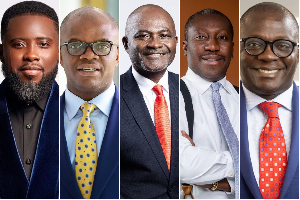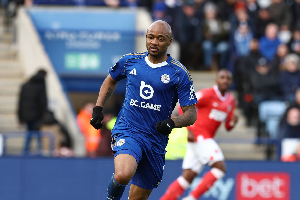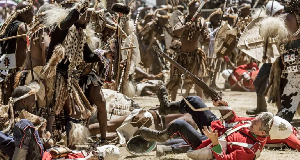Opinions of Thursday, 30 October 2008
Columnist: Adu-Asamoah, Kofi
Has President Kufuor Used His Presidency To Promote Asantehene
Question: Has President Kufuor Used His Presidency To Promote Asantehene Over And Above Other Chiefs Of Ghana ?
Nonsense? Well, read on.Since president Kufuor – an Ashanti and a relative of the current Asantehene – was elected in 2000 by a majority of Ghanaians in accordance with the provisions of our constitution, he has worked tirelessly to subordinate his presidency of the republic of Ghana to the Golden Stool at Manhyia Palace. It is alleged, for example, by sources at the Castle that all ministers and government officials who travel to the Ashanti region on duty have been instructed to call at Manhyia Palace to pay homage to the Asantehene before going about their official business in the region. Foreign envoys, dignitaries, business executives , heads of international organisations, etc etc, are also “encouraged” by the Castle to travel to Kumasi to pay homage to the Asantehene while in the country. Ghana's diplomatic missions, allegedly, have been instructed to promote the Asantehene and the 'Ashanti Kingdom' over and above other Ghanaian tribes. Observers have noted that there is a well coordinated visits/travels by president Kufuor and Otumfuo. It has been observed that before or after almost every visit/travel to a particular foreign country by president Kufuor, the Asantehene will visit the same foreign country for some kind of “award”. For example, president Kufuor recently paid a state visit to an island in the West Indies; Manhyia Palace has just announced that ‘His Royal Highness’ Osei Tutu II has been invited by a university in the West Indies to receive an honorary doctorate degree award – hopefully the citation will tell us why he deserves it. The point has now been reached where a president who was elected by the majority of all the tribes of Ghana – the majority of whom are not Ashanti – now literally prostrates himself regularly before his tribal chief the Asantehene. The Asantehene acutely aware of the constitutional significance of the president's public display of such loyalty, obedience and reverence has recently declared publicly that he will honour him (with an honour yet to be created) when he leaves office in January 2009 for “ his unprecedented achievement”. So, is it the case that the Asantehene is superior to other tribal chiefs of Ghana and that is why he is accorded special treatment by Kufuor's government or this is just a case of naked, provocative tribalism and nepotism on the part of President Kufuor?
To be sure, the Asantehene is fundamentally a tribal chief just like all the other tribal chiefs of Ghana (Chapter 22 of the Constitution is on chieftaincy and defines a chief at article 277; the title of 'king' is not mentioned). He and the other tribal chiefs today occupy stools and skins previously occupied by their medieval ancestors. Some of their ancestral tribal chiefs led their tribes from all directions to the land now called Ghana and settled where they are today. Some too, such as the Ashantehene and his tribe, claim they originated from where they are geographically located today within the borders of modern Ghana. Notable among these tribal chiefs were the great and powerful chiefs of the Ashanti kingdom; the warrior chiefs of the tribal kingdoms of Northern Ghana; the eminent and fearless chiefs of the great state of Akim Abuakwa; the spiritual and great chiefs of the Ga people; the learned chiefs of the Fantes; the great chiefs of the Denkyira people, the Ewe people, the Akwamus, the Krobos, and the Nzimas. Today, all these tribal chiefs hold positions of pre-eminence and privilege within and beyond their respective tribal areas in modern Ghana. Although they, individually, represent different tribes, they all serve as symbols of our collective cultural heritage and links to our collective history. So any attempt to raise the profile of one chief over and above other chiefs is likely to create tribal divisions within Ghana - a situation in which the chieftaincy institution itself may become a victim of circumstances.
The chieftaincy institution, without doubt, constitutes the very foundation of our nationhood. Without it, it would be as if the country has no soul. We therefore have to do all we can to prevent it from being politicized or dragged into disrepute. The survival of the institution to date is due partly to its capacity to remain (at least in public) neutral in national politics and partly to the reverence some people in villages and towns mysteriously still have for it. However, the neutrality in national politics was not a voluntary decision by the chiefs; it was imposed by the first president of the republic, Dr Kwame Nkrumah, when it came to light that chiefs were collecting bribes and instructing their people (subjects?) to vote for candidates from their tribes or for the candidates the chiefs themselves preferred. Nkrumah issued an edict ( a sort of fatua) that all chiefs were to stay out of politics and that any chief who failed to obey the edict would be chased out of the country with such ferocity that he would flee and leave his sandals behind. Most chiefs obeyed the edict, except the eminent and fearless (or was it foolhardy?) Osagyefuo Sir Nana Ofori Atta II who defied Kwame Nkrumah and suffered the ignominious consequences. Since that period the tradition has been that tribal chiefs of Ghana “don't do politics”. The tradition has now been enshrined in the constitution of the republic. Article 276 of the constitution forbids any chief from taking “part in active party politics” .
Regrettably, this political neutrality has been disregarded by the current Asantehene on many occasions with impunity. The most recent of this behaviour was at the durbar he held in Manhyia Palace to receive president Kufuor and the NPP presidential candidate Nana Akufo-Addo. The Daily Graphic 10th September 2008 edition covered the event and below are excerpts from its reportage:
President Kufuor took the opportunity to introduce Nana Akufo-Addo and his running mate to Otumfuo and sought Otumfuo’s blessings to enable them to win the elections to which the Otumfuo obliged and said, “I bless you to have a successful election, especially as you come from the Oyoko Clan of which I am the leader."
The President, ......used the occasion to thank Otumfuo and Asanteman for supporting him in his administration, said, "I think I have not disappointed you."
He submitted that the achievements his government had chalked up was unprecedented in the history of the nation but noted that this could not have been achieved without the support of Asanteman.
Otumfuo Osei Tutu said even though, as Asantehene, he could not publicly declare his support for any political party, "I can tell you that it is where I look that my people also look".
The Asantehene commended President Kufuor for the good work he had done for the nation and said at the appropriate time, Asanteman would honour him.
In his short address, Nana Akufo-Addo said the blessings of the Asantehene were crucial to his victory in the elections.
"I respect Otumfuo and I can never do anything without first receiving his blessing," he said to cheers from the gathering.
This is the spectacle which, according to the Daily Graphic, was witnessed at Manhyia Palace on that day - 9th September 2008.
If the reporting was accurate (and there is no evidence to suggest otherwise), then the Asantehene is living dangerously. Such reckless public display of political bias by a chief has not been witnessed since Osagyefuo Sir Nana Ofori Atta's defiance of Kwame Nkrumah, which cost him his title – Osagyefuo – and dignity. Where did the Asantehene find the confidence to say that “even though, as Asantehene, he could not publicly declare his support for any political party, 'I can tell you that it is where I look that my people also look' ” ? It is just like saying to someone, “protocol prevents me from saying publicly that I support you”. Does he know something the rest of Ghanaians don't know in relation to the conduct and outcome of the yet to be held 2008 polls? Or he said what he was reported to have said because of the delusions he now appears to suffer from the special status he has been enjoying under Kufuor's presidency?
Whatever his reasons or motives for saying what he was reported to have said at the durbar, there is no doubt that under Kufuor the Asantehene's status has been greatly enhanced. Infact his status under Kufuor's presidency can be likened to that of the Pope or the King of Swaziland. With Kufuor's encouragement, support and guidance the Asantehene has secretly transformed Ashanti region into Ghana's 'Vatican city' or, if you prefer, Ghana's 'Kingdom of Swaziland'. The Asanatehene has his own coat-of-arms; he has his kingdom's flag with his emblem on it; he has his own palace guards; he travels in a motorcade of about eight expensive vehicles with Ghana Police outriders’ sirens blaring and all traffic stopped to clear the road for him; his official car flies his ‘kingdom's’ flag and the Ghana national flag; the number plate of his official car is 'Ashanti One'; he has his own personal security guard; he travels abroad with his cook and butler; he invites and receives foreign heads of state and heads of international organisations at Manhyia palace; he bestows honours on Ghanaians and foreigners; he has revenue raising powers; he is able to borrow money from international financial institutions in his capacity as 'king of Ashanti' without the knowledge or consent of Parliament – he recently borrowed millions of US dollars from the world bank; it is alleged he has represented Ghana abroad on Kufuor's behalf; he describes himself as a “king” and tells the world so (contrary to the provisions of chapter 22 of Ghana's constitution); he has been heard to use the phrase ”my people” – this phrase if used in Ghana would be assumed to mean Ashantis, but when used outside Ghana, as he has frequently done, it could easily be construed by his audience to mean Ghanaians!
While the Asantehene has been allowed by President Kufuor to enjoy the trappings of a head of state in Ashanti region, the rest of the paramount chiefs of Ghana who are of equal eminence have been ignored, sidelined or at best dealt with at polite arms-length by the Kufuor administration. Chiefs need to be treated equally according to their traditional rank/status. Where one chief is singled out and placed on a pedestal over and above chiefs of equal status because he happens to be the tribal chief of the president's tribe, the other paramount chiefs and their people will be justified to bear a grudge against the government which allowed that state of affairs to exist. Future governments must through the chieftaincy ministry discourage this type of tribalism. Upright journalists must monitor the future relationships between the president of the republic and our traditional chiefs for signs of preferential treatment founded on tribal affiliation.
Now, having read this article, do you still think it is nonsensical to suggest that President Kufuor has used and continues to use his presidency to promote the Asantehene over and above all other paramount chiefs of Ghana? You make up your mind. The author of this article, however, believes that President Kufuor has used, and continues to use, his presidency to promote the Asantehene and Ashanti culture over and above all other Ghanaian tribal chiefs and their cultures not because of the preeminence of the Asantehene but purely for reasons of tribalism and nepotism. So, for the sake of the futures of both the institution of chieftaincy and our constitutional arrangements, let us wake up and challenge this deliberate, provocative and almost medieval attempt by a powerful cabal within the NPP administration to promote the Asantehene as a 'king' who is preeminent in relation to all the paramount chiefs of Ghana.
If we fail to act now, not only will such a state of affairs seriously fracture our society to the detriment of our developing democracy, but could also potentially undermine our collective effort to build a country future generations will be proud of.
Kofi Adu-Asamoa














